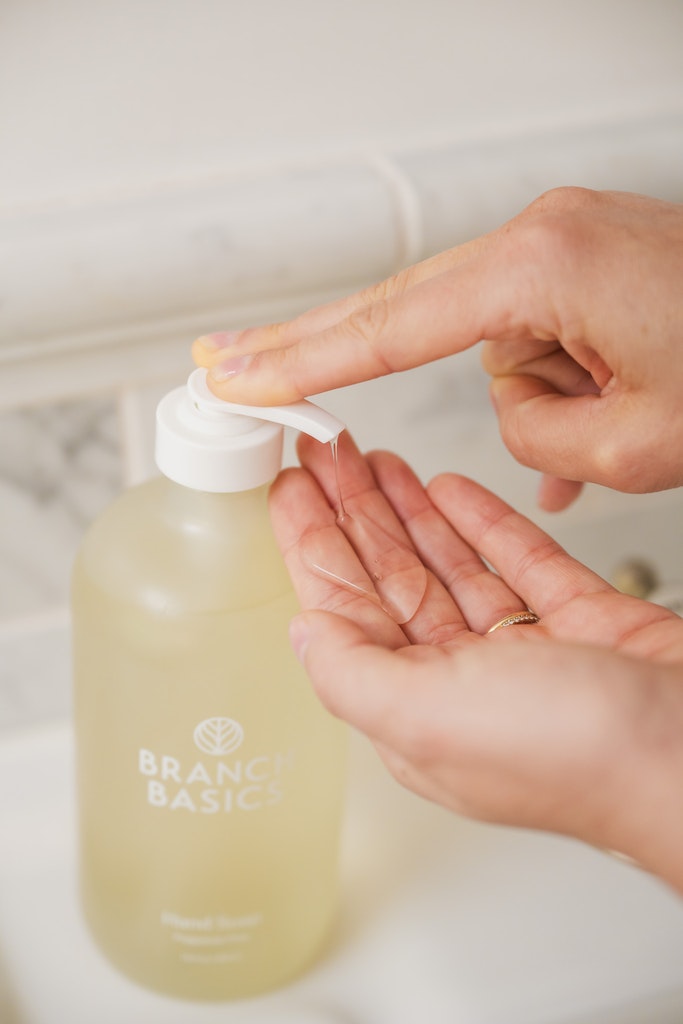Antibacterial vs. Regular Soap: Which Should I Choose?

Handwashing with soap and water is an effective way to maintain a healthy lifestyle. In this day and age, antibacterial soap is often regarded as the hero in warding off bacteria.
But here’s the scoop - you don’t really need antibacterial soap to rid your skin of germs and pathogens. So what’s the difference between antibacterial soap vs regular soap?
In fact, the U.S. Food and Drug Administration (FDA) states there isn’t enough science to prove that washing with antibacterial soap vs regular soap is any better at reducing the risk for illness.
Not to mention, overuse of antibacterial soap raises concern for negative effects on your health and the environment. This is because harmful synthetic chemicals, not found in regular, naturally-derived soap options like Branch Basics, are added to the long list of ingredients.
Today we’ll share the differences and why it’s recommended to opt for a high-quality, natural and human-safe household soap over antibacterial soap.
Antibacterial Soap vs Regular Soap: Key Differences
When it comes to comparing soap options, you may find one significantly outweighs the other. Due to the toxin load found in antibacterial soaps, we recommend choosing regular soap for household use because they are:
- Made with safe, natural ingredients
- Less harsh on the environment
- Proven effective at removing germs and bacteria from the skin
- Safe for everyday household use
Before you lather up, let’s take a deeper look at the key differences between antibacterial soap and regular soap.
Ingredients
In 2016, the FDA banned the use of 19 chemicals typically found in antibacterial soaps. These chemical ingredients were added because of their ability to kill and prohibit the growth of bacteria.
Manufacturers, however, were not able to prove their safety and effectiveness, leading to the ban. In lieu of the prohibited chemicals, manufacturers now use ingredients with unknown effects, including:
- Benzalkonium chloride
- Benzethonium chloride
- and chloroxylenol (PCMX)
The ingredient list for regular soap is much more simple, however. Void of antibacterial agents, regular soap contains only naturally-derived ingredients. Soap makers use fats, oils, and an alkali ingredient, such as sodium hydroxide, to create soap.
Environmental Impact
Simply put, antibacterial soaps are bad for the environment. Regular use of antibacterial soap means regular flushing of toxic chemicals down the drain. This negatively impacts aquatic life and their habitats due to the accumulation of toxic chemicals in wastewater.
On the other hand, regular soap is a more green option as it lacks the added synthetic chemical agents found in antibacterial soaps. This significantly reduces the risk to waterways and the aquatic life that live there.
With Branch Basics Hand Soap, you can rest assured that the ingredients are both ultra gentle and safe for the environment!
Skin Sensitivity
Antibacterial soaps contain synthetic chemical additives that can be harsh on the skin. These non-pH balanced ingredients can cause redness, dryness, itching, and irritation, especially for those with skin sensitivities.
Regular hand soap is often formulated without the use of any harmful synthetic toxins. The limited, milder ingredients are kind to even the most sensitive of skin. This makes regular soap much more safe for the whole family.
Effectiveness at Killing Germs
Originally meant for medical environments, synthetic chemicals in antibacterial soaps inhibit the reproduction of both good and bad bacteria. Our bodies need healthy bacteria to fight illnesses and to keep our immune systems strong. Overuse of antibacterial soaps, however, can cause the body to become antibiotic resistant - an issue touched on below.
On the other hand, regular soap doesn’t actually kill bacteria. Instead, the action of handwashing with regular soap and water physically removes germs from your skin. Thanks to science, we know that the molecular structure of soap is what makes it so effective. With the help of a “polar” head and a hydrophilic “nonpolar” tail - both water-loving and water-resisting molecules - these molecules work to dissolve bacteria, which is then rinsed down the drain.
Antibiotic Resistance
Overuse of antibacterial soap can reduce the healthy bacteria on the skin, remove natural oils and cause skin to dry out. This creates a breeding ground for certain bacteria to grow and mutate, causing antibiotic resistant superbugs.
To avoid antibiotic resistance, use regular soap and water to wash away germs. Because regular soap lacks antibacterial additives, the risk of resistance to antibiotics is far from an issue.
Uses
As previously mentioned, antibacterial soap was originally created for medical environments. Because of their ability to kill bacteria, antibacterial products are mostly used for cleaning deep and infected wounds. This begs the question - why then are they so widely used in daily household products?
The answer: Because it sells.
For daily use, the FDA recommends using regular soap and water. Regular soap is a much safer and sustainable option for long-term use. Many regular soaps, such as Branch Basics, are made with gentle, human-safe ingredients formulated to care for your skin - not harm it. Chamomile, aloe vera, and meadowfoam oil are just a few of the naturally-derived ingredients used in our products.
Choose a Human and Home Safe Alternative: Branch Basics
A simple way to choose a human and home safe soap alternative is to cleanse your skin of bacteria without the use of antibacterial agents.
Select liquid and bar soaps consciously crafted with only the safest ingredients, like Branch Basics Foaming Wash or Branch Basics Gel Hand Soap, instead of a sanitizer, antibacterial soap, or a disinfectant.
How do you use our Hand Soaps?
To create our Foaming Wash, you’ll need our multi-purpose Concentrate, which creates several human-safe cleaning products (like an All-Purpose Spray, Bathroom Solution, etc). It’s our bestseller, tough on germs yet gentle on all surfaces and materials! It’s truly an all-in-one formula.
To make our Foaming Hand Wash:
- Fill the Foaming Wash container with water to the “water” line on the label.
- Add the Concentrate to the “soap” line, and wash away.
Our Gel Hand Soap is already bottled (in a beautiful glass bottle) when you purchase. It’s a luxurious, thick gel that lathers your hands and rinses away dirt and grime!
All Branch Basics products are made with only plant and mineral-based ingredients, safe for babies and pets, biodegradable, and free of fragrance and any harsh synthetic chemicals.
Both Branch Basics hand soaps are a great solution for a safe hand soap, it’s just a personal preference between gel and foam.
Related Reading: 8 Best Natural Disinfectants for Everyday Use, Is Branch Basics a Sanitizer or Disinfectant?, and Does Branch Basics Kill Germs?
Toss Toxic Products With Branch Basics
For your home, should you choose antibacterial soap vs regular soap? The answer is clear: Toss the toxins found in antibacterial soaps and opt for a safer, fragrance-free, regular soap alternative, like Branch Basics!
Try the Branch Basics Premium Starter Kit and replace all your toxic household cleaning products. Needless to say, your health is truly in your hands!
Marilee Nelson
Marilee Nelson is an Environmental Toxins expert who has spent nearly 30 years advocating for the chemically-sensitive and chronically-ill. She is a Board Certified Nutritionist, Certified Bau-Biologist and Bau-Biology Inspector and specializes in Food As Medicine. She has helped thousands of families and individuals identify, heal and recover from toxic exposures and is on a mission to revolutionize the way American families view their health.








